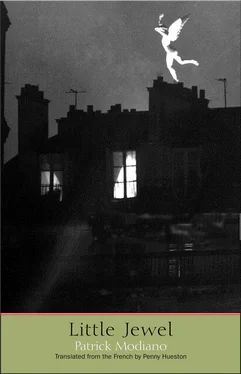‘What I am looking for in life…’ I took a deep breath. I absolutely had to say something. Someone like him, who spoke twenty languages, would not have understood if I said nothing.
‘I’m looking for…a human connection…’
He didn’t seem disappointed by my answer. Again, he stared at me with his bright, clear gaze; I had to lower my eyes. And those beautiful hands, flat on the table — I could imagine those fine, long fingers sliding over the keys of a piano. I was so susceptible to eyes and hands.
He said, ‘I was struck by a word you used earlier: “settle”.’
I didn’t recall using the word. But I was flattered that he had found such significance in the few words I had said. Such banal words.
‘The problem is settling on something…’
At that moment, despite his calm, gentle voice, he seemed as anxious as I was. He even asked if I had ever felt that horrible sensation of floating, as if a current were sweeping you away and there was nothing to hang on to.
Yes, I knew that feeling. Days and days went by, indistinguishable one from another, sliding as evenly as the moving walkway at Châtelet. I was swept along an endless corridor; I didn’t even need to walk. And yet, one evening soon, out of nowhere, a yellow coat would catch my eye. In that crowd of strangers, one of whom I had become, a single colour would stand out, a colour that I could not lose sight of if I wanted to know a bit more about myself.
‘We have to settle on something so that life is no longer this constant floating.’ He smiled at me as if he wanted to sound less serious. ‘Once we find it, then everything will be fine, don’t you think?’
I had the impression that he was trying to remember my first name. Once again, I had the urge to introduce myself by saying, ‘I used to be called Little Jewel.’ I would then tell him everything, from the beginning. But all I said was, ‘My first name is Thérèse.’
The other night, on the median strip, I had asked him what his first name was and he had replied, ‘No first name. Just call me Badmaev. Or Moreau, if you prefer.’ I was taken aback. But later I thought it was his way of protecting himself, of keeping his distance. He didn’t want to get too close to people. Perhaps he was hiding something.
He suggested that I come back to his place. He had a book to lend me. He lived in one of the apartment blocks opposite Le Corentin café, on the other side of Boulevard Jourdan. Brick apartment blocks, like the one in Vincennes where I would see my mother crossing the courtyard. We walked past a series of identical façades. At number 11 Rue Monticelli, we climbed a set of stairs to the fourth floor. The door opened onto a hallway with dark-red linoleum. At the end of the hallway was his bedroom. There was a mattress on the floor and books piled along the walls. He asked if I’d like to sit on the only chair, in front of the window.
‘Before I forget — I have to give you this book.’
He bent over the stacks of books and appraised each one. Finally, he picked a book that stuck out from the others because of its red cover. He held it out to me. I opened it at the title page: On the Outer Limits of Life .
He seemed apologetic, and said, ‘If you find it boring, you don’t have to read it.’
He sat on the edge of the mattress. The room was lit only by a small bare bulb attached to the top of a tripod. The light was weak. Next to the mattress, instead of a table, was a gigantic radio with fabric over the speaker. I had seen a similar one at Fossombronne-la-Forêt. He caught me looking at it.
‘I really like this radio,’ he said. ‘I sometimes use it for my work. When I can work from home.’
He leaned over and turned a knob. A green light came on. A muffled voice began speaking in a foreign language.
‘Do you want to know how I work?’ He picked up a writing pad and a biro from the top of the radio and wrote, on and off, while listening to the voice. ‘It’s easy…I take it all down in shorthand.’
He came over and handed me a page. I have kept the piece of paper with me ever since that evening.
Just below the shorthand were these words: Niet lang geleden slaagden matrozen er in de sirenen, enkele mijlen zuidelijd van de azoren, te vangen .
And then the translation: ‘Not so long ago, sailors managed to capture mermaids, a few miles south of the Azores.’
‘It’s in Dutch. But he read it with a slight Flemish accent from Anvers.’
He turned the knob and the voice faded. He left the green light on. So that was his work. He was given a list of programs to listen to, either during the day or at night, and he had to translate them before the next day.
‘Sometimes they’re programs from a long way away… people speaking odd languages.’
He listened to them at night, in his room, to keep in practice. I pictured him lying on his bed, in the darkness punctured by the greenish light.
He sat down on the mattress again. He told me that, since he’d been in the apartment, he’d hardly ever used the kitchen. There was another bedroom but he left it empty and never went in there. Besides, after listening to so many foreign broadcasts, he ended up not really knowing what country he was in.
The window looked onto a large courtyard and the façades of apartment blocks where, on every floor, the lights were on in other windows. Sometime later, when I followed my mother home for the first time, I was sure that the view from her window was the same as the one from Moreau-Badmaev’s window. I looked in the street directory hoping to find her name, and I was surprised at how many people lived there. Fifty or so, among whom were at least ten single women. But her maiden name was not listed, nor was the assumed name that she had used in the past. The concierge had not yet told me that her name was Boré. And then I had to look up the street directory again. I had lost Moreau-Badmaev’s telephone number. There were just as many names listed under his street as my mother’s. Yes, apartment blocks, whether at Vincennes or at the Porte d’Orléans, were identical. His name, Moreau-Badmaev, was there. It was proof that I had not dreamed it all up.
That evening, while I was looking out the window, he said that the view was ‘a bit dreary’. Early on, he’d felt stifled here. He could hear every sound from his neighbours, the ones on his floor and the ones living above and below. It was a constant racket, like the noise in a prison. He thought he was destined to be locked in a cell in the middle of hundreds and hundreds of cells occupied by families or single people like himself. At the time, he was just back from a trip to Iran and had lost the habit of living in Paris, in big cities. He had gone there to learn a language, Persian of the plains.
It was not taught anywhere, not even at the School of Oriental Languages. So he’d gone there the year before to learn it on the spot. Coming back to Paris, to the Porte d’Orléans, had been difficult, but now the noise of the other tenants didn’t bother him at all. All he had to do was switch on the radio and gently turn the dial. And, once again, he would be far away. He didn’t need to travel. All he needed was to turn on the green light.
‘If you like, I could teach you Persian of the plains…’
He said it jokingly, but the sentence resonated because of the word ‘plains’. I knew I would be leaving Paris soon and had no real reason to feel trapped by anything. All sorts of horizons stretched out before me into the distance, plains as far as the eye could see, sloping down to the ocean. One last time, I wanted to assemble a few meagre memories, find some vestiges of my childhood, just like the traveller who keeps an out-of-date identity card in his pocket until the end. There wasn’t much to gather together before leaving.
Читать дальше












